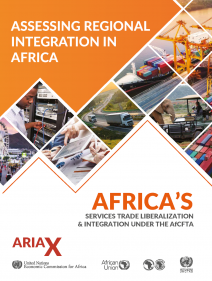Assessing Regional Integration in Africa X (ARIA X) focuses on issues in Africa’s services trade liberalization and integration in the context of the AfCFTA. It builds on earlier related works to deepen our understanding and appreciation of the critical roles of services—especially in the digital era—in trade, production and the economy in Africa. The report critically analyses approaches to liber¬alizing trade in services and to regional regulatory cooperation that have the most potential to support Africa’s development, including through enhancing intra-African trade in services. The establishment of regional value chains to enable more effective integration into global value chains and greater competitiveness in the services sector’s digitalizing global economy are of prime concern. ARIA X report has ten chapters organised under three main sections. The first is the introductory and conceptual section, comprising of a traditional chapter that tracks progress and trends in regional integration on the continent since the last edition, ARIA IX chapter 1; a chapter that surveys services trade and services trade policies in Africa chapter 2; and a transitional chapter that reviews insights from literature on the impacts of services trade restrictions on development. This chapter sets the tone/provides a framework for the thematic section of the report chapter 3. The second is the thematic section, which focuses on analyzing liberalization and regulation in five priority sectors in the AfCFTA agreement, namely; financial services, transport services, communication services, tourism, and business services. Cross-border financial services trade is the focus of Chapter 4. Chapter 5 on transport services trade begins by reviewing literature on frameworks for regulating and facilitating that trade and presenting major challenges and opportunities. For a concise overview of the communications sector as understood in the AfCFTA context, Chapter 6 sketches core developments, particularly developments in policy and legal/regulatory liberalization. It argues for the importance of general good practice regulatory framework principles for liberalization, rather than service-specific commitments. The focus of Chapter 7 is how to encourage intra-African tourism, indicating the sector’s importance in Africa. For trade in business services, Chapter 8 examines the regulatory and facilitating frameworks in the business services sector. The third section discusses the development of services value chains and building of both public and private sector capacities, including in the negotiation of services trade liberalization, as well as the establishment and effective implementation of regulatory structures and frameworks for the AfCFTA chapter 9. The section also has a chapter on the overall conclusion and recommendations chapter 10.
Share this:
Release Date:
7 December, 2021
© United Nations Economic Commission for Africa

